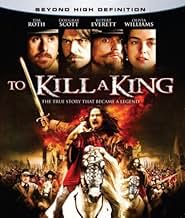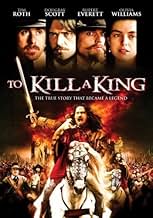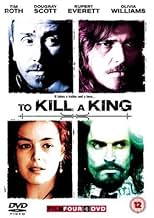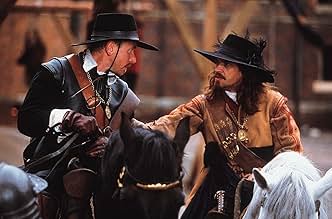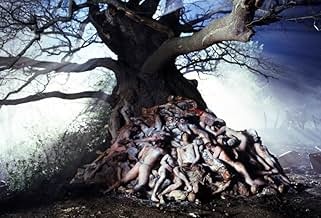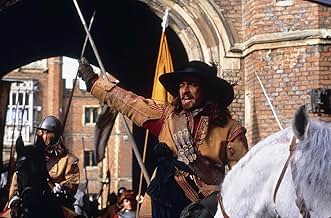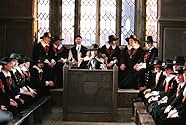AVALIAÇÃO DA IMDb
6,2/10
3,5 mil
SUA AVALIAÇÃO
Um relato da relação entre o General Fairfax e Oliver Cromwell, enquanto eles tentam lidar com as consequências da deposição do rei Carlos I.Um relato da relação entre o General Fairfax e Oliver Cromwell, enquanto eles tentam lidar com as consequências da deposição do rei Carlos I.Um relato da relação entre o General Fairfax e Oliver Cromwell, enquanto eles tentam lidar com as consequências da deposição do rei Carlos I.
- Direção
- Roteirista
- Artistas
- Indicado para 1 prêmio BAFTA
- 3 indicações no total
Avaliações em destaque
To Kill a King is directed by Mike Barker and written by Jenny Mayhew. It stars Tim Roth, Dougray Scott, Olivia Williams, James Bolam and Rupert Everett. Music is by Richard G Mitchell and cinematography by Eigil Bryld.
It's the end of the English Civil War and with King Charles 1st (Everett) held prisoner by the Parliamentarians, Sir Thomas Fairfax (Scott) and Oliver Cromwell (Roth), friends and colleagues, fall out over the best plan of action for the New England.
A severely troubled production and budgetary constraints left To Kill a King with a mountain to climb just to get acknowledged as a historical epic of worth. Add in the dubious take on this part of English history that so irked the historians, and you would be forgiven for thinking that the film is something of a stinker. Not so actually. For although it's clearly far from flawless, it's a literary piece of work that chooses character dynamics over blood and thunder. Suffice to say that those searching for a battle strewn epic should look elsewhere, but if you have a bent for observations on key personalities involved in war politics during times of upheaval in a period setting? Then this delivers the goods. Well performed by the principal players as well. 7/10
It's the end of the English Civil War and with King Charles 1st (Everett) held prisoner by the Parliamentarians, Sir Thomas Fairfax (Scott) and Oliver Cromwell (Roth), friends and colleagues, fall out over the best plan of action for the New England.
A severely troubled production and budgetary constraints left To Kill a King with a mountain to climb just to get acknowledged as a historical epic of worth. Add in the dubious take on this part of English history that so irked the historians, and you would be forgiven for thinking that the film is something of a stinker. Not so actually. For although it's clearly far from flawless, it's a literary piece of work that chooses character dynamics over blood and thunder. Suffice to say that those searching for a battle strewn epic should look elsewhere, but if you have a bent for observations on key personalities involved in war politics during times of upheaval in a period setting? Then this delivers the goods. Well performed by the principal players as well. 7/10
My reaction to this movie was similar to my reaction to "Elizabeth: The Golden Age." A lot of attention was paid to casting and period costuming and location. However, budget constrictions apparently were such that the story could not be told on a greater scale. For example, the movie begins with the mopping up after Cromwell's army has defeated the royalist forces. But unless you are well versed in English history, you don't know why or how they were fighting. (Like the Roman Legions, Cromwell's--or Fairfax's--army had a distinct organizational, tactical and weapon advantage over their opponents.) Gradually the differences in philosophy of governing is portrayed and we begin to get some idea of why everyone hated Charles I, although we really don't see much from a commoner's perspective. The reason for the close relationship of Lady Fairfax to the King and to Cromwell is never made clear (at least not to me). If you have to tell this story with limited locations, then it's better done as a mini-series, where the historical reasons for the conflict can better be elaborated. If you're going to make a movie, at least show us some battle scenes and better explain the motives for everyone's actions.
In 1645, after the revolutionary movement of the puritans against the King of England Charles I of Stuart (Rupert Everett), with the leadership of the best friends General Oliver Cromwell (Tim Roth) and General Thomas Fairfax (Dougray Scott), the king is judged and condemned to death by decapitation. General Oliver Cromwell wishes to implement the republic in England, but his monarchist friend Fairfax does not agree, and they break their friendship. Cromwell becomes a dictator, with the title of Lord Protector of the Commonwealth, until 1658, when he is very sick and dies. When I was a student, I had classes about this period of England history, but unfortunately not enough to make any judgement of the historical accuracy of this movie. As far as I remember, the period of the dictatorship of Cromwell was very violent, and it was omitted in the story. As a film, it is a beautiful story of the friendship and relationship of two leaders with different political objectives. The cast and direction are excellent, and the reconstitution of the period is wonderful. I have appreciated and recommend this movie without analyzing the accuracy of the events. If the viewer knows this period of history well, he will have the opportunity to verify its accuracy, otherwise he will a chance to enjoy a good movie. My vote is seven.
Title (Brazil): 'Morte ao Rei' ('To Kill a King')
Title (Brazil): 'Morte ao Rei' ('To Kill a King')
It's amazing that, three decades after Antonia Fraser's great biography of Cromwell ("Cromwell: Our Chief of Men", 1973; out in a new edition, 2002), the old clichés and inaccuracies about him - ultimately derived from the post-Restoration character assassination satirized in "1066 and All That" - are still being as enthusiastically retailed as they are in this film.
That the dominant image of Cromwell is going to be of Ollie the psychopath is telegraphed in advance by the casting of Tim Roth to play him. Why people think this man can act has always been a mystery to me, but ever since "Reservoir Dogs" he has become so identified with the image of a psychopath that his mere presence is a sign that irrational violence is coming up soon. Right at the beginning of the film we are smacked over the head with this characterization when, before we have heard Cromwell speak a word, we see him barely being restrained from murdering a defenceless man. Later he organizes the torture and then murder of a prisoner, randomly shoots a street vendor in the leg, and ordains a painful execution for a would-be assassin in a fit of uncontrolled rage.
On the other hand, he loves his old mate Fairfax, spends hours writing up a proper constitutional settlement to give ordinary people the right to a fair trial, and shows an almost Woody-Allenesque unconfidence in his abilities as a military commander (comically, since even his enemies conceded his military genius). All these positive character traits are presumably thrown into the mix in order to give the semblance of roundedness, depth, or complexity to the characterization. The trouble is that the combination makes this Cromwell not complex, but simply incoherent. One cannot suspend disbelief in him. That's why, in this case, to say "it's a movie, not history" is not an answer to the criticism. It's precisely because it doesn't make sense as history that it doesn't work as a movie either.
The film is also notable for perpetuating the great Royalist lie that Charles I's death warrant was signed by the regicides before the verdict had been announced - indeed, before the trial had even begun. The document was certainly drawn up in advance (the defendant's guilt being as much a matter of public record as Goering's at Nuremberg), but there is no evidence that it was *signed* beforehand; on such a serious matter it's extremely unlikely the regicides would have opened themselves to the accusation of not observing the proper legal process (see the excellent page about the death warrant that I give the address for in the message boards). From the point of view of film-making, though, the most striking thing is how it totally squandered the dramatic opportunity of the trial itself - which took three days, incidentally, not, as it's presented here, three minutes, with people shouting "guilty" before any evidence has even been presented. As an opportunity to probe Charles's psychology, as he was presented with evidence of the damage his actions had caused, it was completely wasted.
Rupert Everett plays Charles brilliantly, and in the context of a better film it's a performance that would surely have drawn more of the plaudits that it deserves. His mixture of regal dignity, seductiveness, arrogance, and overweening self-belief make a compelling portrait (being true to life, these contradictions, unlike those assigned to Cromwell, actually make a coherent whole). Throughout all his conversations with his captors, his fundamental inability to accord their grievances the slightest legitimacy clearly illustrates how frustrating and ultimately fruitless the attempt to negotiate with him must have been, and why the conflict could only end with his death. Dougray Scott also brings gravitas and pathos to his role of Fairfax, and he sustains the tension of his conflicting loyalties well - even if that tension is historically bogus. As actors, he and Everett deserve to have been in a better film.
While Americans work the comparatively narrow seam of their history so intensively, it's a great shame that the Brits don't make more of some of the incomparably dramatic moments in their own. An even greater shame that, when they occasionally get the chance, it's fluffed with a script of such silliness and banality as this.
That the dominant image of Cromwell is going to be of Ollie the psychopath is telegraphed in advance by the casting of Tim Roth to play him. Why people think this man can act has always been a mystery to me, but ever since "Reservoir Dogs" he has become so identified with the image of a psychopath that his mere presence is a sign that irrational violence is coming up soon. Right at the beginning of the film we are smacked over the head with this characterization when, before we have heard Cromwell speak a word, we see him barely being restrained from murdering a defenceless man. Later he organizes the torture and then murder of a prisoner, randomly shoots a street vendor in the leg, and ordains a painful execution for a would-be assassin in a fit of uncontrolled rage.
On the other hand, he loves his old mate Fairfax, spends hours writing up a proper constitutional settlement to give ordinary people the right to a fair trial, and shows an almost Woody-Allenesque unconfidence in his abilities as a military commander (comically, since even his enemies conceded his military genius). All these positive character traits are presumably thrown into the mix in order to give the semblance of roundedness, depth, or complexity to the characterization. The trouble is that the combination makes this Cromwell not complex, but simply incoherent. One cannot suspend disbelief in him. That's why, in this case, to say "it's a movie, not history" is not an answer to the criticism. It's precisely because it doesn't make sense as history that it doesn't work as a movie either.
The film is also notable for perpetuating the great Royalist lie that Charles I's death warrant was signed by the regicides before the verdict had been announced - indeed, before the trial had even begun. The document was certainly drawn up in advance (the defendant's guilt being as much a matter of public record as Goering's at Nuremberg), but there is no evidence that it was *signed* beforehand; on such a serious matter it's extremely unlikely the regicides would have opened themselves to the accusation of not observing the proper legal process (see the excellent page about the death warrant that I give the address for in the message boards). From the point of view of film-making, though, the most striking thing is how it totally squandered the dramatic opportunity of the trial itself - which took three days, incidentally, not, as it's presented here, three minutes, with people shouting "guilty" before any evidence has even been presented. As an opportunity to probe Charles's psychology, as he was presented with evidence of the damage his actions had caused, it was completely wasted.
Rupert Everett plays Charles brilliantly, and in the context of a better film it's a performance that would surely have drawn more of the plaudits that it deserves. His mixture of regal dignity, seductiveness, arrogance, and overweening self-belief make a compelling portrait (being true to life, these contradictions, unlike those assigned to Cromwell, actually make a coherent whole). Throughout all his conversations with his captors, his fundamental inability to accord their grievances the slightest legitimacy clearly illustrates how frustrating and ultimately fruitless the attempt to negotiate with him must have been, and why the conflict could only end with his death. Dougray Scott also brings gravitas and pathos to his role of Fairfax, and he sustains the tension of his conflicting loyalties well - even if that tension is historically bogus. As actors, he and Everett deserve to have been in a better film.
While Americans work the comparatively narrow seam of their history so intensively, it's a great shame that the Brits don't make more of some of the incomparably dramatic moments in their own. An even greater shame that, when they occasionally get the chance, it's fluffed with a script of such silliness and banality as this.
STAR RATING:*****Unmissable****Very Good***Okay **You Could Go Out For A Meal Instead*Avoid At All Costs
As a kid,I used to love learning all about the Tudors and Stewarts,especially about monarchs such as Henry the Eighth (sorry,I'm terrible at my Roman numerals),Edward the First (the youngest ever monarch) and Charles the first who was beheaded.So when I saw a film trailer promoting a new film about Charles and his conflict with Oliver Cromwell,who became head of the Roundheads,Charles's greatest adversaries,I felt inclined to go and see it as soon as possible.
The results were admirable,though not great.It boasts a fine central cast,in the shape of Tim Roth as Cromwell,Dougray Scott as his aide Thomas Fairfax,James Bolam as roguish parliamentary speaker Holles and Rupert Everitt as the ill-fated king himself.They all play their parts with dash and spirit,which can only be a good thing.And there's some fine photography and lavish costume design to add to the recommendations.
On the down side however,Mike Barker's direction becomes a little meandering and laboured and there are some fairly huge historical inaccuracies in the telling of the tale.
Still,everyone involved looks like they're enjoying starring in it,as indeed any 'actor' probably would,as this sort of period piece is how many such exhibitionists learn the art of fine drama.Just get yourself in the right mood,mosey on out,and I'm sure you might enjoy watching them perform it just as much.Or almost.***
As a kid,I used to love learning all about the Tudors and Stewarts,especially about monarchs such as Henry the Eighth (sorry,I'm terrible at my Roman numerals),Edward the First (the youngest ever monarch) and Charles the first who was beheaded.So when I saw a film trailer promoting a new film about Charles and his conflict with Oliver Cromwell,who became head of the Roundheads,Charles's greatest adversaries,I felt inclined to go and see it as soon as possible.
The results were admirable,though not great.It boasts a fine central cast,in the shape of Tim Roth as Cromwell,Dougray Scott as his aide Thomas Fairfax,James Bolam as roguish parliamentary speaker Holles and Rupert Everitt as the ill-fated king himself.They all play their parts with dash and spirit,which can only be a good thing.And there's some fine photography and lavish costume design to add to the recommendations.
On the down side however,Mike Barker's direction becomes a little meandering and laboured and there are some fairly huge historical inaccuracies in the telling of the tale.
Still,everyone involved looks like they're enjoying starring in it,as indeed any 'actor' probably would,as this sort of period piece is how many such exhibitionists learn the art of fine drama.Just get yourself in the right mood,mosey on out,and I'm sure you might enjoy watching them perform it just as much.Or almost.***
Você sabia?
- CuriosidadesThe films turbulent production was constantly beset with financial problems & funding went bankrupt twice during filming. the film was only barely completed & eventually released through private investment.
- Erros de gravaçãoIn the opening sequence, Fairfax shoots the sword out of the hand of Cromwell's assassin with a flintlock pistol at about 30 yards range. Such pistols had no rifling at that period and were incapable of nowhere near such accuracy, even in the hands of an expert. To shoot at that range Fairfax would have been more likely to have hit the assassin. Also the bullet struck sparks from the sword hilt when it hit. This is impossible as the bullet would have been a soft lead ball and incapable of creating a spark.
- Citações
Denzil Holles: At last we all can sleep soundly, knowing that for once the King cannot impose a new tax on us in the morning.
Sir Thomas Fairfax: You make it sound as if you fought the war only to save your profits, Holles!
Principais escolhas
Faça login para avaliar e ver a lista de recomendações personalizadas
- How long is To Kill a King?Fornecido pela Alexa
Detalhes
- Data de lançamento
- Países de origem
- Idioma
- Também conhecido como
- To Kill a King
- Locações de filme
- Empresas de produção
- Consulte mais créditos da empresa na IMDbPro
Bilheteria
- Orçamento
- US$ 14.300.000 (estimativa)
- Faturamento bruto mundial
- US$ 567.471
- Tempo de duração1 hora 42 minutos
- Cor
- Mixagem de som
- Proporção
- 2.35 : 1
Contribua para esta página
Sugerir uma alteração ou adicionar conteúdo ausente

Principal brecha
By what name was Morte ao Rei (2003) officially released in India in English?
Responda

